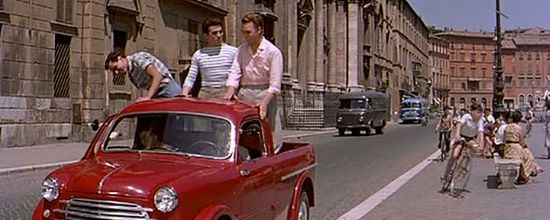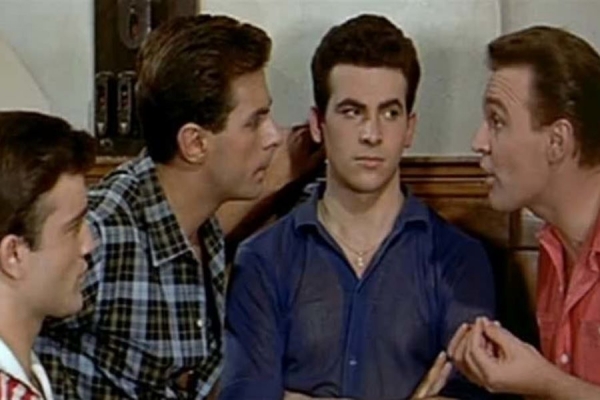Therefore, it would be fair to say that due to his untimely death, Franciolini doesn’t get the same global recognition as other Italian directors, like Bernardo Bertolucci and Federico Fellini. Like Bertolucci and Fellini, Franciolini had a distinctive style, social realism in a gritty and often witty format. Franciolini liked to make films about real people in real situations. Therefore, Alberto Moravia’s classic anthology (Racconti Romani – Roman Tales) about everyday Italians in everyday Rome would motivate Franciolini. Both artists studied human interaction and the outcomes as their primary source of inspiration.
Alberto Moravia (28th November 1907 – 26th September 1990) was an Italian novelist, journalist, and native Roman. Unable to get a publishing deal in 1929, Moravia took it upon himself to fund his debut novel, Gli Indifferent (The Indifferent Ones). A touching story which spans over two days that studies the emotional relationship between a mother and her two sons in Rome. The novel was a success, with two film adaptations in Moravia’s lifetime, 1964 and 1987. Moravia is an inspiration for all self-published authors across the world.
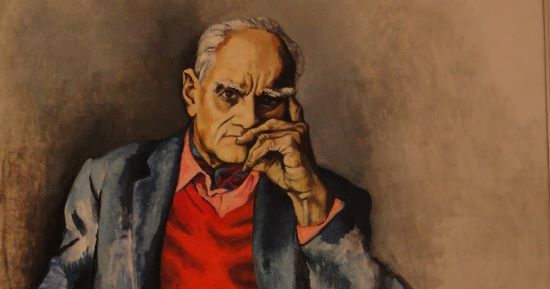
Moravia, a well-documented anti-fascist, converted his ideology to The Conformist, 1951 (Il conformista). A story about Marcello and how he converted to Benito Mussolini’s regime. Bernardo Bertolucci would adapt this novel in 1970.
Roman Tales originally appeared as sixty-one short stories in the Italian newspaper Il Corriere Della Sera before being published in 1954. The stories chiefly focus on Rome's outsiders, circus performers, lorry drivers, waiters, the unemployed, petty criminals. Intriguing characters all with a story to tell as they try to get by on the streets of Rome.
Franciolini’s version of Roman Tales was the second adaptation. The first was in 1954, Too Bad She's Bad, directed by Alessandro Blasetti, starring screen goddess Sophia Loren and Marcello Mastroianni, based on one short story, Fanatico, about a young couple who try to con a taxi driver in Rome. The third adaptation was A Roman Balcony (1960), directed by Mauro Bolognini, a story about Davide Saraceno (Jean Sorel), a young man who experiences touching and erotic adventures in the external city.
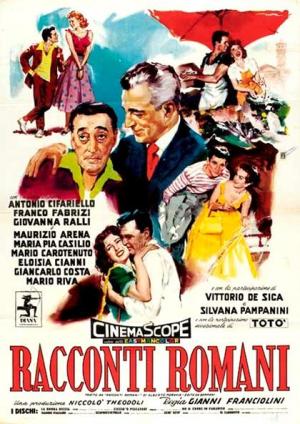
Franciolini’s reworking of Roman Tales primarily concentrates on the petty crime aspect of Moravia’s novel. Alvaro (Franco Fabrizi, The Birds, the Bees, and the Italians, I Vitelloni) is released from prison after serving six months for threatening a man with a knife. Inspired by the anecdotes of his fellow inmates that crime does pay, the handsome, young, arrogant, and impressionable Alvaro returns to his city with a plan. That he and his three loyal and often misled friends, Mario (Maurizio Arena, Gli altri, gli altri... e noi, Il principe fusto), Otello (Antonio Cifariello, Le avventure di Nicola Nickleby, In Search of the Castaways) and Spartaco (Giancarlo Costa. Costa would not appear in another film until 1983, Una gita scolastica, 28 years after Roman Tales) can be their own bosses. A charming yet bullish leader, Alvaro easily manipulates the trio to follow his orders.
However, Alvaro’s plan is not to become crooks but to raise funds through low-level criminal enterprises so that they can purchase a van for a haulage business, which Alvaro believes will be highly lucrative. So begins a descent into petty crime, from ticket touting at a friendly football game between Italy and England at the iconic Stadio Olimpico, to the lads impersonating the vice squad to issue on-the-spot fines for kissing couples in Villa Borghese gardens in Rome.
All these capers are amusing and enchanting, and any fans of Only Fools and Horses and Minder will appreciate their antics, as there are echoes of Del Boy and Arthur Daley, ducking and diving by any means necessary.
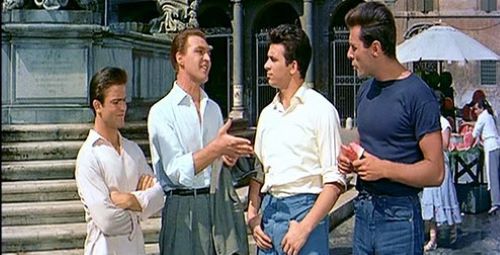
Yet Roman Tales isn’t just about scams; it’s about the ups and downs of relationships of the common folk in an urban setting, from their bond as friends to their loved ones, from their mothers to their girlfriends. Like Mario's beautiful and fiery partner, Maria (Silvana Pampanini, Law of the Streets, The Belle of Rome). Maria loves to keep her boyfriend in line yet often fails miserably. Furthermore, all the time, Alvaro, Mario, Otello, and Spartaco are trying to get rich quickly; they are soul searching, but without knowing it.
Franciolini, the cast and the bright and eye-catching cinematographer (Mario Montuori, a native Roman), tells a story that tackles social struggle in an endearing, amusing, and poignant manner.
Furthermore, any lovers of the Modernist style will appreciate the clothes, from the casual look of -shirts with chino trousers to the silk shirts and tailor-made suits. Alvaro and co. are impeccably dressed in every scene regardless of the occasion. Lovers of vintage fashion will adore the stunning Italian women's colourful tea-length swing and slim sheath dresses. Witnessing the clothes featured in Roman Tales and other Italian films made in the fifties and early sixties, we can understand how the British embraced the Italian look. In particular, the working class in the Mid-fifties onwards, as it was and still is, a smart and elegant appearance.
In short, a lively and beautiful film that will undoubtedly make you smile, as well as getting excellent fashion tips.
